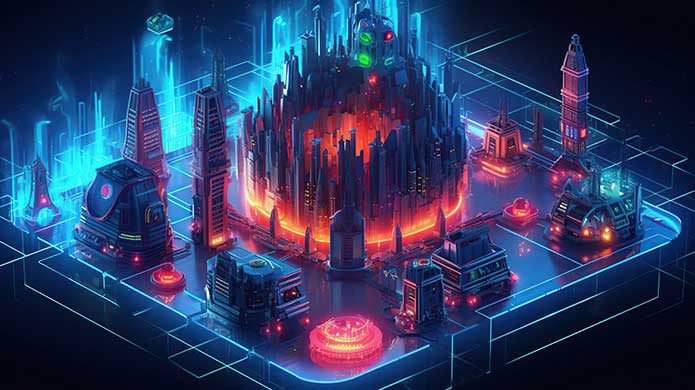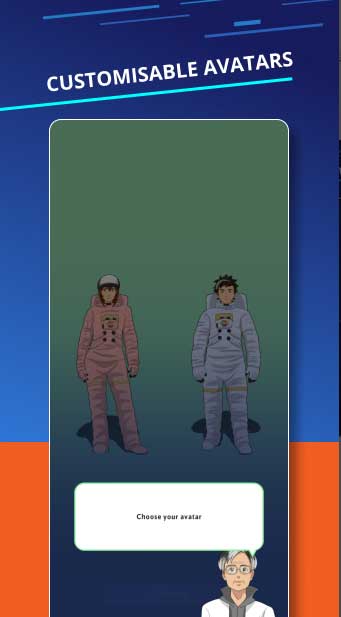Did Blockchain revolutionize the gaming landscape? Or did gaming push the boundaries of blockchain innovation, unlocking new frontiers for decentralized gaming environments?
In each case, the synergy between two highly influential ecosystems brought unprecedented innovations, embodied in increased transparency and security, and revolutionized in-game asset ownership. The integration of Blockchain in gaming has changed the traditional gaming model, creating new opportunities for players to truly own, trade, and monetize their in-game assets.
In this article, we explore Play-to-Earn crypto games. Read on as we discover what blockchain games are and how to earn real money from playing.
What are Blockchain Games?
 Blockchain games are electronic games that exist on top of the Web3, utilizing blockchain technology to introduce new mechanics and concepts into the gaming experience. However, due to (current) blockchain limitations, Web3 games are created in a so-called hybrid environment, both on-chain and off-chain, taking the best of both worlds.
Blockchain games are electronic games that exist on top of the Web3, utilizing blockchain technology to introduce new mechanics and concepts into the gaming experience. However, due to (current) blockchain limitations, Web3 games are created in a so-called hybrid environment, both on-chain and off-chain, taking the best of both worlds.
Due to the complexity of modern games, which have become more dynamic than ever, Blockchain-based games rely on off-chain code, allowing speed and scalability.
On the other hand, the on-chain part refers to the movement of in-game items and tokens, utilizing smart contracts and, more often than not, NFTs.
Smart Contracts in Blockchain-Based Games
 The introduction of smart contracts in blockchain games has elevated the gaming experience to a whole new level by enabling the trustless and automated execution of different functions in the game environment.
The introduction of smart contracts in blockchain games has elevated the gaming experience to a whole new level by enabling the trustless and automated execution of different functions in the game environment.
Simply put, in traditional games, the game owners decide which in-game items players can own and how they can use them. Moreover, they can also decide to strip the item or replace it with some other due to changed game rules or policy.
This is not possible in Web3 games, where every item is an NFT. As such, it can’t be taken away from players, deleted, or replaced. In other words, players have actual ownership over in-game items and tokens.
In Blockchain games, players are in control of their items, deciding to buy, sell or trade their ownership over in-game cosmetic items.
What are Play-to-Earn Games?
 Play-to-earn games (P2E) are a type of Blockchain game where players are incentivized to play, participate in community events or advertise games through referral programs.
Play-to-earn games (P2E) are a type of Blockchain game where players are incentivized to play, participate in community events or advertise games through referral programs.
In essence, a P2E game is just like any other. But there’s one difference – here, you can earn just from playing.
Generally speaking, you can earn from any traditional game if you’re good enough. You can earn by streaming or participating in eSports tournaments. However, it is vital to note this model is entirely different.
Play-to-earn games allow you to earn money by spending a specific amount of time in the game, completing quests, meeting game objectives, or simply purchasing other in-game items.
As a result, you receive rewards in the form of cosmetic items like weapons, skins and avatars or the game’s native token, which you can later exchange for any digital or fiat currency on any CEX or DEX crypto exchanges.
How Can I Earn from Web3 Games: Real World Example
The earning concept in blockchain games has been illustrated in the recent years through a game named DogemonGo, which bears a resemblance to the widely-known Pokemon game.
In Dogemon, you earn rewards by playing or simply moving through its metaverse. Yes, you read that well – all you need to do is walk, jog, play or run, and you’ll get your portion of the incentive. Moreover, you can own land and earn $FRO while other players play on it.

Finally, like in the popular Pokemon title, here too, you can locate, capture and train your Dogemon to improve its attributes, fight against others and earn more in-game items or DOGO, the in-game’s native token.
Now, here’s the exciting part – accumulating 50,001 DOGO tokens provides you with the opportunity to convert them into one Dogecoin. Additionally, you can utilize the acquired cryptocurrency to trade for other crypto assets or traditional fiat currency, enabling you to earn actual money.
Since you have true ownership of your tokens, you can exchange them at any time. Your tokens do not have an expiry date.
Sadly, we’ve had reports from users that the project has been discontinued as of late, and the NFT rewards are no longer obtainable. So we don’t recommend this game in particular, but it’s still a nice example of what can be done, and there are many P2E games which are actually working and growing in userbase currently. There are also some big blockchain game projects being developed, such as Champions Tactics, endorsed by massive video game editor UBISOFT.
Because the world of cryptocurrencies is dynamic and prices are quite volatile, the value of your tokens is never the same. Because of this, experienced players avoid exchanging their in-game currency immediately upon reaching the 50,001 mark.
Instead, they find a reliable and trustworthy crypto exchange to monitor the Dogecoin price chart and exchange their in-game tokens once the cryptocurrency reaches its peak. Such an approach allows you to optimize earnings while indulging in blockchain-based games.
Conclusion
Play-to-earn games are blockchain-based games that reward players for their play or community contribution. Due to the smart contract implementation, players have become true owners of their in-game assets, allowing them to buy, sell and trade the acquired items within the game community.
However, the biggest value of blockchain-based games is that players can earn cryptocurrencies by participating in different events and performing various in-game actions. Because of the price volatility, the value of players’ rewards fluctuates. To maximize their earnings, experienced Web3 games players follow crypto prices on trusted exchanges and make strategic decisions on when to convert their in-game rewards into cryptocurrencies.


 by Symphonie
by Symphonie